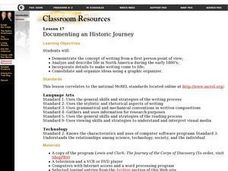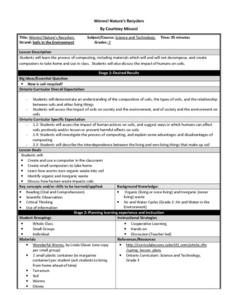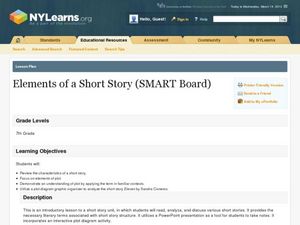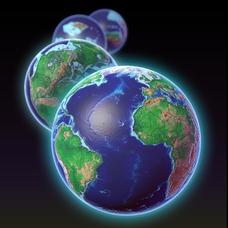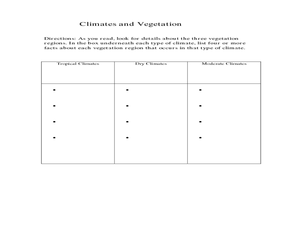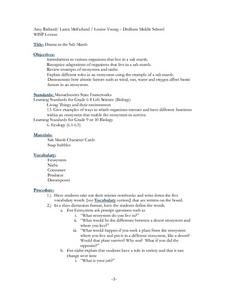Curated OER
Documenting an Historic Journey
Students read and analyze journals written by Lewis and Clark. They watch and discuss a video segment, complete a graphic organizer, and write a journal entry written from the point of view of someone involved with the Lewis and Clark...
Curated OER
The Lynx Eats The Hare
Students investigate the predator and prey relationship. This is done using a simple simulation. The simulation is done as an arts and craft activity. Students record data and track it using a graphic organizer and then they discuss the...
Curated OER
Follow the Road to Riches
Students study the story of gold and silver mining in the San Juan region. Through the use of interactive video and the Internet, they will examine the various events occurring at this time. They create a timeline highlighting the major...
Curated OER
SAFETY KNOWLEDGE BASE CHANGES
Middle schoolers research and formulate a hypothesis for research to correlate changing safety regulations in regards to personal and environmental safety polices for storage, handling and disposal of chemicals, risk involved in...
Curated OER
Web of Life - Role-Playing
Students role-play how organisms adapt to their environment. They play 20 questions with plant and animal habitats. They create a web of life to demonstrate how each plant and animal relies on the other for survival.
National Nanotechnology Infrastructure Network
Understanding Wave Motion - Slinky vs. Snaky: Which Spring is Dominant?
Ride the wave to an understanding of refraction! The first in a series of two inquiry-based lessons challenges learners to create transverse waves with two different types of springs. As their wave hits an object, they observe the change...
Columbus City Schools
Biome Basics with a Disastrous Twist
Bored with your current biome bag of tricks? This bundle is a bountiful bag of biome fun! Travel the globe with seventh graders and explore the biotic and abiotic factors that define our world's biomes. Then, introduce a little chaos to...
Curated OER
Worms, Nature's Recyclers!
Students study what worms need to survive in different environments. They study how worm composting improves soil and reduce waste. They discuss composting techniques and present a puppet show about a worm's life.
Curated OER
Elements of a Short Story (SMARTboard)
TV for homework? Your pupils' dreams have come true! After reading Sandra Cisneros's "Eleven," they analyze the elements of the story, particularly the plot and and climax. The lesson plan could work with any short story that you are...
Virginia Department of Education
The Cell Cycle and Mitosis
What a packed instructional activity! Provide your class with the opportunity to learn about the cell cycle in several exciting ways. Biologists first learn about the theory behind mitosis, then proceed to view onion tips under the...
Google
Be Internet Awesome
Teach the qualities of a digitally smart citizen with a set of lesson plans created by Google. Along with creating strong passwords, learners explore how to protect their privacy, when to stand up for others against cyberbullying, and...
Howard Hughes Medical Institute
EarthViewer
Can you imagine Washington DC and London as close neighbors occupying the same continent? Learners will be fascinated as they step back in time and discover the evolution of the earth's continents and oceans from 4.5 billion years ago to...
Roy Rosenzweig Center for History and New Media
European Explorers
To compare how the Spanish, French, and English approached the exploration of North America, class groups examine primary source documents and become experts on one of four explorers: Francisco Coronado, Robert LaSalle, Samuel de...
Science 4 Inquiry
Edible Plate Tectonics
Many people think they can't observe plate tectonics, but thanks to GPS, we know that Australia moves at a rate of 2.7 inches per year, North America at 1 inches per year, and the Pacific plate at more than 3 inches per year! Scholars...
Michigan Sea Grant
Food Chains and Webs
Starting with a simple food chain, young scientists interpret the difference and interrelatedness between herbivores, carnivores and producers. They answer questions related to cause and effect of food chain disruptions, including the...
Curated OER
Element Research Project
Students research elements on interactive Internet periodic tables, take notes using Inspiration software, and write descriptive paragraphs with graphics. They create presentations.
Curated OER
Got Plants
Second graders discover that all living things need food in order to live. In groups, they examine the interconnectedness between animals and plants. They identify which animals eat plants to survive and which animals eat animals that...
Curated OER
Yuckiest Site on the Internet
Students investigate the worm and the cockroach. In this organisms lesson, students visit suggested websites to identify the characteristics of worms and cockroaches. Students dissect a worm and observe a live cockroach. Students report...
Curated OER
Entering the Twilight Zone
Students describe major features of cold-seep communities and the process of chemosynthesis as it relates to organisms in each habitat. In this deep-sea habitats lesson plan, students study the categorization of ocean habitats according...
Curated OER
Physical Geography- Climate
Sixth graders explore different climates. In this compare and contrast lesson, 6th graders look at the differences in climates of America and Europe. Students use KWL charts and graphic organizers to record information about different...
Curated OER
Creating the "Perfect" Horse
Students examine the relationship between a horse and its rider. In this behavior and interactions activity students research the Internet to learn about horse behavior and biology then write a paper and present it to the class.
Curated OER
Winter
High schoolers explore the nature of water and water molecules. They examine the role of ice on organisms.
Curated OER
Drama in the Salt Marsh
Students are introduced to the various organisms that live in a salt marsh. They recognize adaptations of organisms that live in the salt marsh. Pupils review concepts of the ecosystem and niche. Students explain the different roles...
Curated OER
Animals of the Fire Ice
Students examine ocean life by identifying methane hydrates. In this ocean life lesson, students research organisms that live in the coldest, deepest parts of the ocean and live off methane hydrates. Students create a group...


